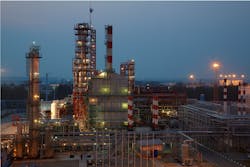The third stage of construction of the Antipinsky Refinery in Tyumen, Russia, will double capacity to 7.5 million tons annually, helping meet the growing demand for clean fuels and other oil products in Russia and the European Union (EU). Deploying Honeywell’s Experion Process Knowledge System (PDS) to control plant processes and general refinery facilities is part of an initiative to create a single, central operations center at the refinery.
“There is significant demand for Antipinsky Refinery products, both in the region and throughout Russia and the EU,” said Leonid Sorkin, general manager, Honeywell Russia. “Honeywell’s advanced process automation systems will help the business grow efficiently and safely.”
At the Honeywell Users Group (HUG) Americas Symposium in Phoenix in June, Honeywell released several advances to its Experion PKS, including features that address operator fatigue, collaboration and cybersecurity.
“Experion PKS provides a continuous and more comprehensive flow of information about refinery operations,” said Alexander Rodionov, Russia sales leader, Honeywell Process Solutions. “This enables operators to spot potential problems more quickly, help them make better-informed decisions about plant operations, and keep the plant running safely and efficiently.”
At Antipinsky Refinery, Honeywell’s process control platform will “empower our workforce and greatly enhance the safety and efficiency of the refinery’s processes,” said Gennady Lisovichenko, general manager and member of the board at Antipinsky Refinery.
The new construction is part of the refinery’s plan to increase its capacity of crude oil processing and to enable production of products in the next year that meet the EU quality of the Euro-5 emission standards. The project also includes the construction of a water treatment plant, sewage treatment plant, steam generation plant and other general refinery facilities. This phase of construction is expected to be completed by the end of this year.
Also as part of the initiative, Honeywell will supply up to 60 additional workstations to the refinery, which will be installed in the unified refinery control center.
Leaders relevant to this article:

